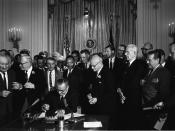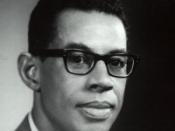What is the Civil Rights Act of 1964 and whom does it protect?Slavery, segregation, poverty, and racism have shaped the health status of African Americans throughout American history. One hundred years after the Emancipation Proclamation of 1863, blacks were still denied the right to vote in some states and received an inferior education in most. Barriers to public health services and hospital care contributed to excess illness and death. Historically, African Americans have used the public policy process to facilitate the social changes necessary to win the full rights of citizenship. This process peaked during the civil rights movement of the 1960s, when Congress passed the Civil Rights Act of 1964, probably the most progressive legislation in American history. The act outlawed discrimination in public accommodations, public schools, and health care facilities. It also made possible the Medicaid-Medicare legislation of 1965, which led to improved health status of African Americans and other racial and ethnic minority groups.
The specific source of the Civil Rights Act of 1964 was President John F. Kennedy. He began gaining support for it in a televised national address by urging Americans to take action to guarantee equal treatment for all. Kennedy then proposed an act dealing with voting rights, public accommodations, desegregation of public schools, and many more items on the civil rights agendas. On July 2, 1964, President Johnson signed the bill that Kennedy had fought for, which created a major piece of civil rights legislation. Although the Civil Rights Act did not resolve all problems of discrimination, it did open the door to further progress by lessening racial restrictions on the use of public facilities, providing more job opportunities, strengthening voting laws, and limiting federal funding of discriminatory programs. The law also encouraged the desegregation of public schools and authorized the withdrawal...


